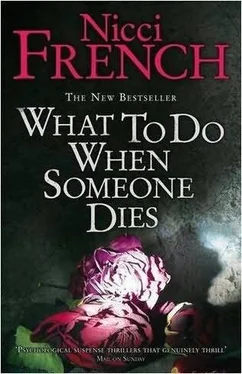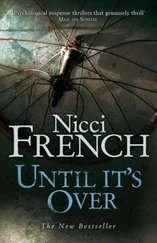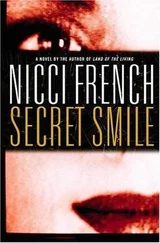‘It’s all about money,’ Frances said thoughtfully, as we lingered over the coffee. ‘If you’re in London and you’ve got money, you can have anything.’ And then she pushed her food, barely touched, away from her and said, ‘Except happiness, of course. That’s a whole different story.’
I didn’t know what to say. In normal circumstances I would have reached across the table and touched her arm, asked what she meant, tried to draw her out. But these weren’t normal circumstances. If she turned to me for support, she would be turning to someone who didn’t exist and, what was more, someone who would leave her before long. So I wrinkled my brow and murmured something meaningless.
‘Would you say you were happy, Gwen?’ she asked, raising her pale, delicate face to me.
‘Oh, well.’ I stabbed my fork into the final sliver of tuna. ‘That’s hard to say. I mean, what’s happiness?’
‘I used to be,’ she continued. ‘It seemed easy once. Or maybe I wasn’t really happy. Maybe I was just having fun. That’s different, isn’t it? I think I used to be very selfish. I didn’t understand that actions had consequences. When Milena and I first met, before we were married, we were a bit like Beth, I suppose – out every night, lots of men, lots of parties, lots of drink. But then it all changed. You reap what you sow, that’s what they say. But I wish I’d understood then what I was sowing. Shall we have a dessert wine?’
‘I’m fine,’ I said. ‘If I drink during the day I fall asleep. But go ahead if you feel like one.’
‘No, you’re probably right, and we should get back to work, I suppose. Sorry to ramble on. Sometimes I feel so…’ But she stopped, shook her head as if to clear it, put her spectacles back on, gave me a wry smile. ‘Right. Let’s go and talk doublets and hose.’
When we returned to the office, I felt Milena’s computer drawing me as if I was attached to it with invisible cords. But I didn’t work on the computer that afternoon. I sketched our thoughts for the party into a coherent proposal. It was so trivial and so interesting that I felt regret that this would surely be my farewell to working with Frances. I finished the proposal and had almost cleared my desk when David arrived to collect her. He was in a bad mood and scarcely glanced in my direction. Frances made an apologetic grimace. I muttered an excuse and left.
When I got home, I ran up to the computer without even taking off my jacket. I went through the tiresome business of typing in my new email address and password, copying each character one by one. There was a new message and I clicked on it.
The previous messages had been written above the one before but now the old ones had been deleted. The subject line said, ‘Who are you?’ and the message repeated, ‘Who are you?’
Against my better judgement, I had promised to be at the latest Party Animals happening because Beth was away for the long weekend she’d been planning. A very long weekend that was actually one day short of a week. ‘Just to give you a better feel for what we do,’ Frances had said, the afternoon before. ‘You don’t need to do anything, really. Just be in the background and keep an eye on things.’ She had examined me dubiously. ‘It’s that women-in-commerce thing you costed,’ she said. ‘You know, dozens of high-powered women networking and complaining about men. So if you could…’ She faltered.
‘Wear a suit?’
‘Yes. Something like that. Thanks, Gwen.’
I didn’t own a suit, or even anything that could be put together to look like a version of one. I hauled myself out of bed and showered under tepid water because the boiler operated in a mysterious and sporadic way and I didn’t have the money to get it adjusted – I didn’t have the money, as it happened, even for food, but I couldn’t think about my bank balance now. It would have to wait, just as everything else would have to wait: friends, a job, real life.
Sure enough, there was nothing in the cupboard that Frances might possibly approve of. The only suit there was Greg’s green-grey one that he had worn when we married and that, even in my rage-filled binge, I hadn’t been able to bring myself to burn. I took it out and examined it. It was lovely, simple and lightweight. I’d helped him choose it and it was the most expensive item of clothing either of us had ever bought. I held it against myself: it was a bit long but I could roll up the legs and put a belt round the waist. When I tried it on, I was startled by how different I looked, how jauntily androgynous. I put on a white shirt and tied an old bootlace round my neck in imitation of a tie. A trilby would have completed the effect, but I didn’t own one, so I put on a corduroy newspaper-boy’s cap that we’d found in Brick Lane one spring morning, tucking my hair underneath it, and putting studs in my ears. Now I didn’t look like Ellie or Gwen, but someone entirely new.
I had time before I needed to leave for the City, so I made myself instant coffee and had the last fragments of the now-soft cornflakes that Greg used to eat sometimes. The light was flashing on my answering-machine but I decided not to listen to the messages. I already knew that half of them would be from Gwen and Mary and they would say, ‘Where are you?’ and ‘Ring me back as soon as you can,’ and ‘What’s going on?’ Then, like a crack addict, I went back to the computer and looked at the email I’d received last night. I didn’t need to, of course. There were still only those three words: ‘Who are you?’ I had no idea what to do next, and although common sense insisted that I leave well alone – leave Frances and Party Animals, leave my snooping and prying, leave my hapless pretence at being someone else, return to the life I’d left behind and try to build a sustainable future – I knew very well that I wasn’t going to. Not yet, anyway. But I couldn’t think of a way to find out the identity of ‘gonefishing’. Obviously, I couldn’t give him my number, home or mobile. I didn’t want to speak to him, to have him hear my voice. But I had to give him some number to ring me on.
Perhaps I could ask Gwen to talk to him, while pretending not to be Gwen, of course, because I was Gwen. But I dismissed the idea, because I didn’t want to be told – as I most definitely would be – that what I was doing was misguided and wrong, and I should stop at once. I already knew that.
I stared at the screen until the words blurred. I stared at my new hotmail address: j4F93nr4wQ5@hotmail.co.uk. And it came to me: what I should do was simply repeat what I’d already done with my email and get myself a new mobile, whose number I wouldn’t give to anyone except ‘gonefishing’. When he rang, I wouldn’t answer, but I would have his number on my phone. That was a step forward, at least.
I had time to buy the pay-as-you-go phone and still be early at the women-in-commerce lunch, which took place in a vaulted basement in the heart of the City, a dimly lit, handsome space of ancient brick, cold stone and muted echoes. A fire blazed in the hearth at one end of the room, and vases holding velvety red roses stood at intervals on the long table. Slender wine glasses – which nobody used because they drank sparkling water – and silver cutlery glinted. It all felt very old-fashioned and masculine, which, as Frances had explained to me, was the point: this was to be like a stereotypical gentlemen’s club taken over by the ladies. It was typical of Frances to make something so establishment simultaneously ironic.
Sure enough, the women, when they arrived, had on the club uniform. They all wore beautiful skirts and jackets and dresses, in black and grey and dark brown, with white shirts, elegant shoes, sheer tights, discreet flashes of gold at their ears and on their fingers. They flowed down the stairs, handing cashmere coats, leather gloves, slender briefcases and furled umbrellas to the staff, and stood in their massed, discreetly ostentatious wealth. I felt shabby, angry, out of place – like a court jester. I wanted to go home, put on my oldest jeans and plane curls off pale, seasoned wood.
Читать дальше












